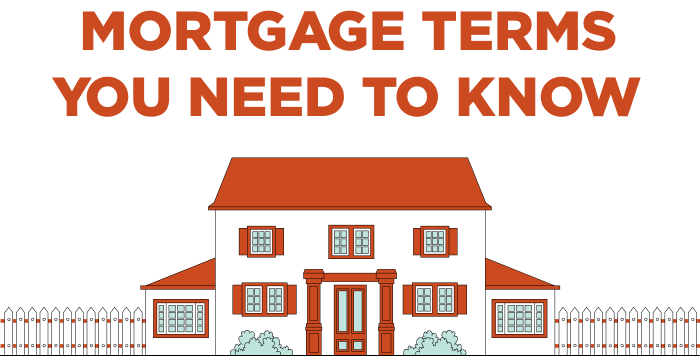
Published July 17, 2024
Homebuyer’s guide to misunderstood mortgage terms
If you’re buying your first house, you might also be hearing important mortgage terms for the first time. Before you apply for a mortgage, it’s critical you have a clear understanding of what the terms mean and how they impact the homebuying experience. Start by reviewing the most misunderstood terms in our infographic below and consult with a mortgage expert for guidance.
- Amortization
- Closing and closing costs
- Credit report and credit score
- Debt-to-income ratio (DTI)
- Down payment
- Equity
- Escrow account
- Fixed- and adjustable-rate mortgages (ARMs)
- Interest rate and annual percentage rate (APR)
- Loan-to-value ratio (LTV)
- Prequalification
- Principal
- Private mortgage insurance (PMI)
- Underwriting

If you’re confused by the following words, you’re not alone; they’re some of the most misunderstood mortgage terms. They’re also some of the most important, so make sure you’re clear on the following definitions.

The process of making regular monthly payments that pay down your mortgage over time. For example, if you take out a 30-year mortgage, your loan will be fully amortized after you’ve made 360 monthly payments.
Note: An amortization schedule shows you how much of each payment goes to principal and interest. As you pay down your mortgage, more of your payment will go to principal and less to interest.

The final step of the homebuying process. Closing costs are fees for expenses required to finalize—or close—your mortgage. These include property taxes, appraisal fee, origination fee/points, application fee, credit report fee, abstract update or title search fee, lender title insurance fee, bank attorney fee, and potentially more.
Tip: Community Bank offers a no closing cost mortgage. For details, visit cbna.com/home-loans/no-closing-cost-mortgages.

Your credit report is a record of your borrowing and payment activities, like whether you’ve paid your bills on schedule and in full.
Your credit score is a number that ranks how likely you are to make loan payments on time based on the information in your credit report. Lenders use your credit score to gauge your risk as a borrower.
Tip: You can access your credit report any time for free with Community Bank’s Credit CompanionSM service. Get the details at cbna.com/digital-banking/credit-companion

Compares your debt to your income. You calculate it by totaling your monthly debt payments and obligations plus the costs of your new home loan (principal, interest, taxes, and insurance) and dividing that by your gross monthly income, which is your pay before taxes and deductions are taken out. For example, if your gross monthly income is $6,000 and every month you pay $200 on a student loan, $300 on a car loan, and $1,000 on your mortgage, your monthly debt payments would be $1,500 and your DTI would be 25% ($1,500 is 25% of $6,000).
When reviewing your mortgage application, your lender will look at DTI to assess whether you’ll be able to manage the monthly payments.

The amount you pay up front when buying a property, usually expressed as a percentage of the home’s value. You then take out a mortgage to pay the rest over time. For example, if you put 20% down on a $300,000 home, your down payment would be $60,000 and your mortgage would be $240,000.
Tip: If possible, it’s worth waiting until you can put 20% down, so you won’t have to pay PMI and may get a lower interest rate. But at Community Bank you can avoid paying PMI costs with only 10% down.

The portion of your home that you own. With every mortgage payment you make, you build equity, owning more and owing the lender less. To calculate your equity, just subtract the amount you owe on your home from its current market value.

When you buy a house, your lender may set up an escrow account to cover your property taxes and homeowner’s insurance. After closing, they’ll put a portion of each monthly mortgage payment into your escrow account and will pay your taxes and insurance when they are due on your behalf.

The interest rate on a fixed-rate mortgage is locked in and won’t change during the term. In contrast, the interest rate on an ARM can fluctuate with market conditions after an initial introductory period. That means your monthly payment can go up or down as well, but not higher than the loan’s interest rate caps, which are the most a rate can increase in a year, or over the life of the term.
Tip: If interest rates drop, your monthly payments on an ARM may go down too, which makes ARMs an appealing option when rates are high. But if rates go up, your payments will go up. Be sure you have wiggle room in your budget if you’re considering an ARM.

Your interest rate is a percentage of the mortgage you pay each year as the cost of borrowing the money, not including fees. But the APR is a more useful number because it includes the related fees, like points and closing costs.

The LTV compares the mortgage amount to the home’s current market value. For example, if you take out a $200,000 mortgage on a house assessed at $200,000, your LTV would be 100%. But if you make a $20,000 down payment, your mortgage would be $180,000 and your LTV would be 90%. Most banks require private mortgage insurance when you finance over 80% LTV but at Community Bank you can avoid paying PMI costs with only 10% down.

When a lender gives you a quick estimate of the mortgage amount you’ll likely qualify for based on a cursory review of your finances. The lender will check your credit score and ask for documentation verifying your income, assets, and debts. If you’re prequalified, you’ll get a prequalification letter with the cost of the home you should shop for. Then, after you make an offer on a house, your application will go through the lender’s underwriting process to confirm the information before giving final approval.

The amount of the mortgage you borrow. Interest is what the lender charges you for borrowing the money. Your monthly payments go to both principal and interest, and as you pay down the principal you’ll also pay less interest on the lower remaining mortgage amount.

Most banks require private mortgage insurance when you finance over 80% LTV to protect their business against loss if you can’t make payments. But at Community Bank you can avoid paying PMI costs with only 10% down. The PMI premium is typically added to your monthly mortgage bill, and once you’ve built a certain amount of equity in your home you should be able to cancel PMI.

When a mortgage underwriter verifies your income, debt, assets, credit history, and information about the property you’re buying to determine how much of a risk it is to loan you the money, and ultimately help your lender decide whether to approve the mortgage.
Getting serious about house hunting? Use our mortgage calculator to compare rates and terms, and to estimate monthly payments.
Explore our Financial Literacy Hub and our blog for content that helps you make money decisions confidently.


